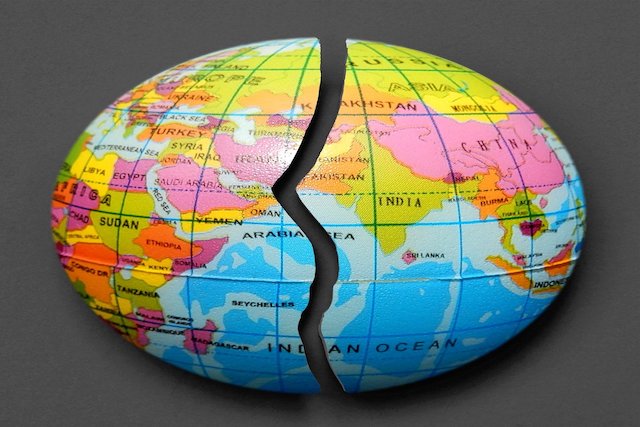Divorce is often a complex process, especially when significant wealth is a factor. However, when separation spans international borders, this can add an extra layer of intricacy that requires careful consideration and expertise. If you are preparing for an overseas separation, answering the question, ‘how does international divorce work?’ can be a critical step in protecting your best interests.
If you’re in the early stages of separation, our blog promises to equip you with the knowledge you need to pursue the best possible outcome for your circumstances.
What is an International Divorce?
Any divorce that is not issued in England or Wales is an international divorce. Depending on the circumstances of what may be a high net worth separation, you might have a job overseas, live in a different place than your former partner, or have different nationalities. While separation is often complex, conflicting jurisdictions can make things more challenging, and usually requires appropriate legal guidance to secure a positive outcome.
When two or more countries are a feature in your relationship, it raises two important questions. Firstly, do you understand in which countries you can get divorced? Secondly, once you’ve established your options, which one is best to either protect your wealth or receive a fair share?
Every country has its own laws around divorce, with no two being exactly the same. This means that the jurisdiction you choose could have serious repercussions for the outcome of your legal separation. If you’re currently wondering ‘how does international divorce work?’it’s important to seek advice from international divorce lawyers as early in the process as possible.
Establishing Jurisdictions for Divorce Overseas
Different jurisdictions present different laws around international divorce. For instance, if you’ve entered into a civil partnership in the UK, you won’t be able to dissolve it in a country in which it isn’t legally recognised.
Additionally, you won’t necessarily need to get a divorce in the same country you were both married, as many places will facilitate the process if you’ve lived there for a period of time.
This means that some couples will have more than one option when it comes to international divorce. How you choose will depend upon the powers available to each jurisdiction. Ultimately, you are only free to divorce in another country in the following circumstances:
- Your Marriage is Legally-Recognised: You can only get divorced overseas in a country that recognises your marriage. For instance, if you are in a same-sex marriage, you will not be able to get a legal separation in a country that doesn’t recognise same-sex marriage. This is the case even when one or both spouses comes from that country originally.
- You Can Establish a Connection: To get an international divorce, either you or your former partner must be able to evidence a connection to that country. Different countries have different ways of establishing jurisdiction, so you should take legal advice to confirm if this applies to your case.
There are rules unique to each country to help establish your connection to them. These broadly fall under the categories of being a national, resident, or domiciled. To explain further:
National
Being a national means you have a legal right to consider yourself a member of that state. Nationality is usually determined by where you were born, but can also be determined by your parentage, adoption or, in some countries, the person you married.
Habitual Residence
Habitual residence effectively means that you’ve lived in a certain place for prolonged periods of time and have a centre of interest there. To establish habitual residence you would need to show that you’re settled there. It’s worth noting that the definition shifts from one country to another, so should be checked with international lawyers for relevant and up-to-date guidance.
England and Wales determine habitual residence as being the place you usually live and work, retain properties, have a mailing address, hold bank accounts, pay National Insurance, etc. It can even be influenced by factors such as where you register your cars and mobile phone. Ultimately, any moves away from your habitual residence should only be fleeting and temporary.
Domicile
Domicile is a technical term with a few variations. Domicile of origin means the place your father was born, whereas domicile of choice is the place you’ve decided to call home. Choosing a domicile of choice means breaking all associations with your domicile of origin.
Choosing the Right Country for Your International Divorce
There are broad variations around international divorce unique to each jurisdiction. Therefore, if you have more than one option available to you, it’s important to understand the potential impact of your decision. The country you choose can have a significant bearing on the following critical factors:
- The nature of financial orders the court could make
- The cost of the divorce process
- The timescales for deciding child arrangements and financial arrangements
- How easily the courts’ orders can be enforced, either in the country making the order, or in other countries
It’s likely that choosing one country over another for your international divorce could lead to numerous benefits for protecting or securing significant wealth. Some countries’ courts might have more favourable laws towards the financially less well off half of the couple, while others might take much less time to conclude your case. Therefore, if you’re presented with more than one option regarding jurisdiction, your international lawyers will concentrate on which one offers the most favourable outcomes for you.
Another factor to consider is practicality. Some of the more pragmatic considerations might include the language barrier and the cost in other jurisdictions. Divorce can be a time-consuming and stressful experience, so it’s important to think about all of these factors if you’re wondering, ‘How does international divorce work?’
Further Considerations for Divorce Overseas
Once you’ve established where your international divorce can take place — and which has the most favourable conditions — there are other factors to consider. As touched upon elsewhere, you’ll also need to factor in the potentially significant cultural differences that could have a bearing on your case. Timescales and disputes are also important features that may have a bearing on how you proceed.
Don’t Delay
In some cases, whichever party applies for a divorce first will take precedence — for example if both sides apply for a divorce in two separate EU jurisdictions. This is not only the case within the EU but is also an important factor outside of the EU. England and Wales are generally regarded as a better jurisdiction for women, but advice is still strongly advised.
Although it’s important not to rush into a decision, it is essential that you don’t delay unnecessarily if you want your case to be heard in a country that is better suited to your circumstances.
Forum Disputes
If your former partner does not agree that you have strong enough connections to your preferred jurisdiction, they can oppose it. This is known as a forum dispute. Forum disputes can be extremely complex, expensive, and time-consuming, so should be avoided wherever possible. This is where obtaining the right legal advice at the earliest opportunity can become so important.
Financial Settlements in the UK
Within the UK, there are different divorce laws between home countries. England and Wales do not adopt a set formula regarding financial settlements, instead focusing on discretion and the welfare of the whole family unit. English and Welsh courts will take a holistic view of the welfare of children, the length of the marriage, earning potential, financial needs, pensions, trusts etc.
However, Scotland and Northern Ireland don’t have the same laws. Therefore, if a couple spent equal time between England and Scotland, they may be able to get divorced under either English or Scottish jurisdiction. This would again make a case for each party receiving comprehensive legal representation to determine which country was better for each client.
Make the Right Choice With Lowry Legal’s Specialist International Divorce Lawyers
The question, ‘How does international divorce work?’ leads to answers that are far too complex to leave to chance. An emerging boutique law firm, Lowry Legal has proven expertise in both international and domestic family matters, so can simplify your case. We specialise in divorce and separation cases that involve significant wealth and have a track record for discretely representing high profile figures and entrepreneurs.
Whether you’re looking to protect your assets as much as possible during divorce proceedings, or are keen to secure a fair outcome, we have the experience to help.
Our talented team is experienced in the whole scope of family law, from making child and financial arrangements, to drafting nuptial agreements and protecting business interests. A holistic firm, we can harness the skills of external experts wherever necessary. While we always aim to simplify your circumstances by encouraging open dialogue, we’re ready to offer robust guidance when collaboration proves to be impractical.
To speak to one of our specialist international divorce lawyers, contact us today, or email enquiries@lowrylegal.co.uk.
Request a Callback
Leave a few details below and one of our team will be in touch to discuss how we can support you with your legal needs. Please note that we cannot offer Legal aid.














